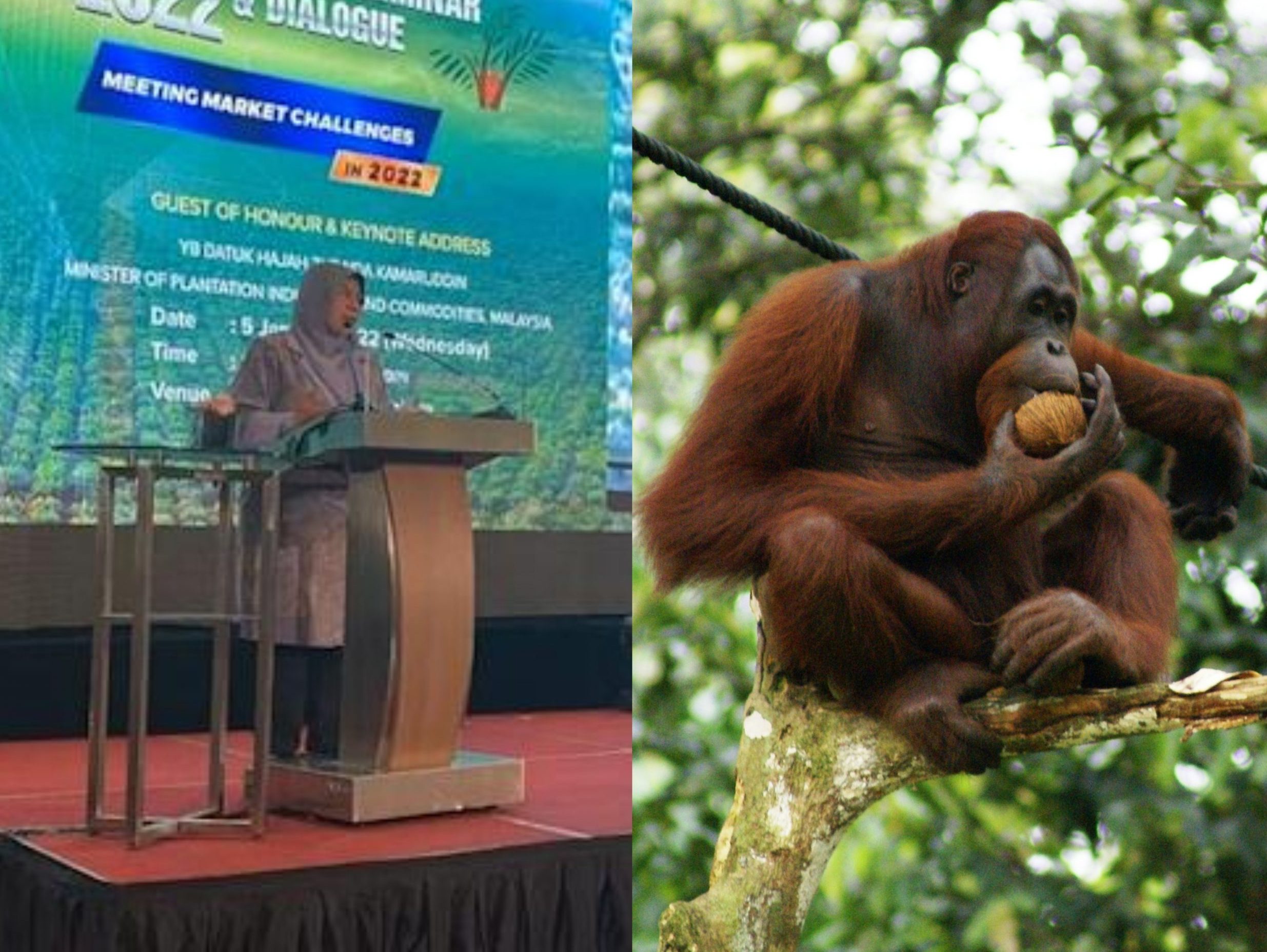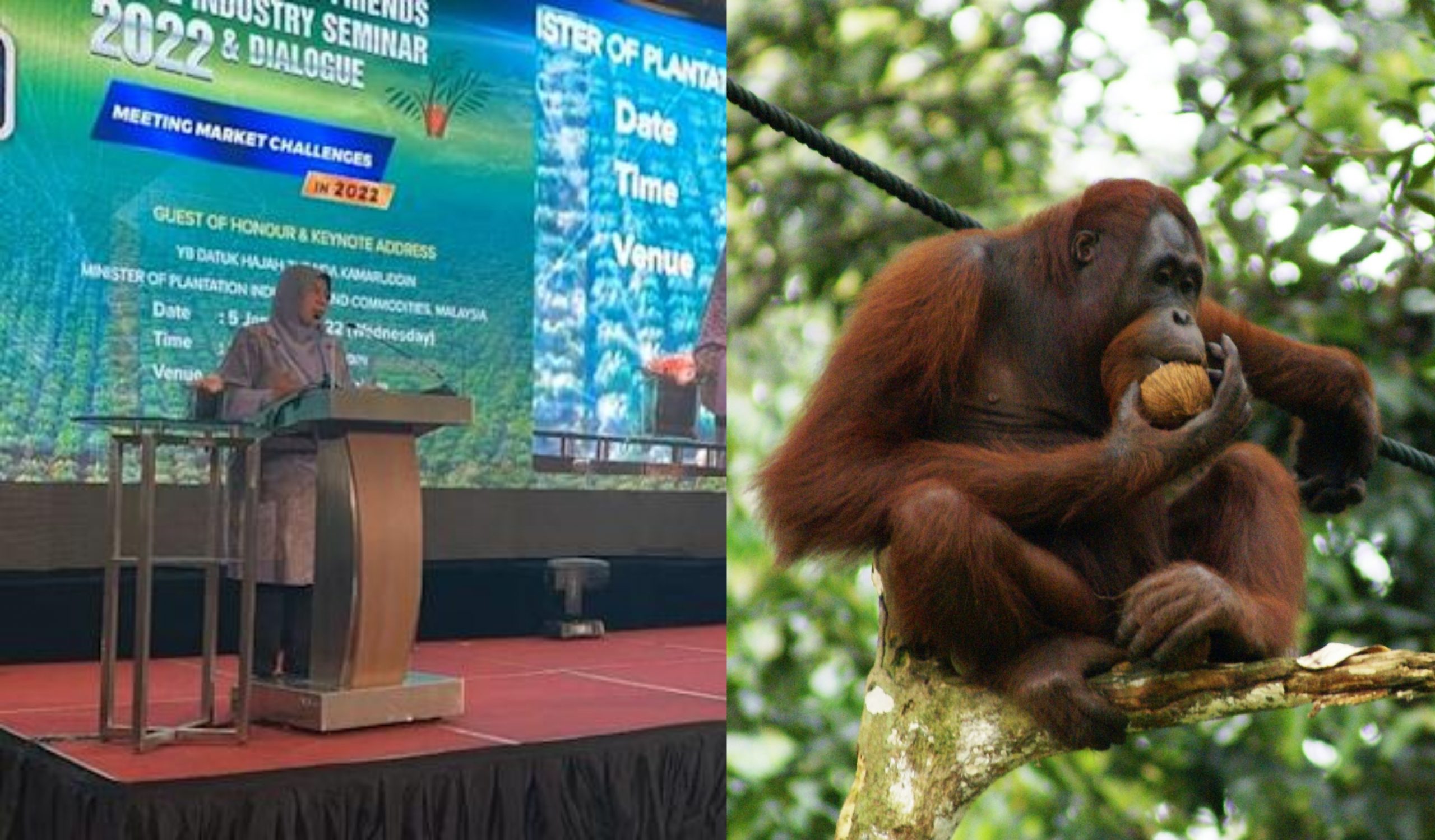WATCH: Plantation Industries Minister Claims Orangutans “Would Kill People First” & Netizens Are Furious
 Thirsty for JUICE content? Quench your cravings on our Instagram, TikTok and WhatsApp
Thirsty for JUICE content? Quench your cravings on our Instagram, TikTok and WhatsApp

Netizens and environmentalists were stunned by a viral video clip of a speech in which Plantation Industries and Commodities Minister Zuraida Kamaruddin defended the Malaysian palm oil industry by saying it was not hurting the orangutan population and claiming that orangutans “would kill people first”.
According to Malaysiakini, Zuraida mentioned that while she was on her umrah pilgrimage, the minister found out that Arab schools still have books that are casting a negative light on palm oil, because “we kill the orangutan”.
The minister was probably referring to claims by both international and local wildlife conservation organisations that palm oil plantations are exacerbating deforestation and destroying the habitats of already endangered species, including orangutans.
Zuraida then claimed in her speech that in Malaysia, if a human was to see an orangutan, the normally docile animal would kill the human first. She further went on to state that the Wildlife and National Parks Department (Perhilitan) has procedures to remove orangutans, instead of killing them.
You can watch the clip here:
Banyak benda boleh belajar dari menteri2 yg bijak pandai:
1) di Malaysia, kalau orang utan jumpa manusia, orang utan bunuh manusia dulu 🧐
2) di Malaysia ada singa 🧐
Selamba aaah cikgu aku dulu tipu kat sekolah, tak ajar benda2 ni 😝 pic.twitter.com/saU8zc6YhN
— Rafizi Ramli (@rafiziramli) January 19, 2022
Netizens immediately began to point out the flaws in her claims. Besides the obvious one about orangutan behaviour, others pointed out that as orangutans are found in Borneo, they come under the purvey of the Sabah Wildlife Department and the Sarawak Forestry Corporation, not Perhilitan.
Take a look:
this is highly irresponsible, @zuraida_my.
our orangutans can only be found in borneo malaysia. sabah wildlife department & sarawak forestry corporation are the two agencies governing wildlife conservation there, not perhilitan. our wildlife laws & enforcement are not the same. https://t.co/CQZwPHupvU
— freyr (@notsoaidil) January 19, 2022
Dear Datuk @zuraida_my, I am a native Sarawakian and former orang utan biologist who have worked in the field from Sarawak to Central Kalimantan, studying wild orang utans and for orang utan conservation. Orang utans have more to fear from men sadly than vice versa.
— June Rubis, PhD (@JuneRubis) January 20, 2022
Someone please tell @zuraida_my that Planet Of The Apes was not a documentary.
— Dr Jason Leong 🇲🇾 (@DrJasonLeong) January 20, 2022
Besides that, Ecotourism and Conservation Society of Malaysia (Ecomy) president Andrew Sebastian said he was appalled by Zuraida’s lack of knowledge and that her claim did a disservice both to the environment and the palm oil industry, according to FMT.
He also said Zuraida had failed to acknowledge the well-documented drop in the orangutan population.
“From 1973, it was estimated that there were 288,500 orangutans in Borneo and by 2025, it is estimated to drop to 47,000 only. And that’s why in 2016, the International Union for Conservation of Nature (IUCN) listed the orangutan as critically endangered,” he urged.


 Get Audio+
Get Audio+ Hot FM
Hot FM Kool 101
Kool 101 Eight FM
Eight FM Fly FM
Fly FM Molek FM
Molek FM

